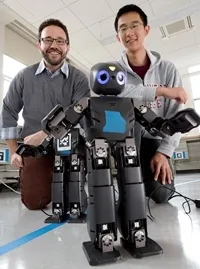Engineering Faculty, Students Participate in Federal Robotics Challenge for Disaster Relief

Keliang He '13 spent his summer programming miniature humanoid robots to maintain balance while standing on one foot (Watch video of the robots here) as part of his summer research experience with Assistant Professor of Engineering Matt Zucker, supported by the Cilento Summer Research Grant. This year, He will be working to create a robot that can save lives.
Swarthmore College is part of a 10-school collaboration, led by Drexel University, that is one of several groups worldwide who were recently chosen to advance robotics technology for disaster relief as part of a challenge issued by the U.S. Defense Advanced Research Projects Agency (DARPA). Teams from academia, industry, and the private sector will attempt to design and deploy a robot capable of disaster response in radioactive or bio-contaminated areas.
"I am studying to become an engineer because I want to work on projects that are useful and that benefit people," says He, from Beijing, China. "It is exciting to be able to create robots that can possibly save lives. The liberal arts approach to engineering at Swarthmore has given me skills in mechanical engineering, electrical, and computer engineering, and mathematics, which has prepared me for research like this opportunity."
Researchers from each of the chosen teams will work in collaboration to tackle specific aspects of the challenge, which is broken into eight specific activities related to disaster relief. The robot must mount, drive, and dismount a vehicle; travel across rubble; remove debris; open a door and climb a ladder; use a tool to break through a concrete wall, then locate and shutoff a leaky valve; and remove and replace a pump. Zucker and He will work on the door opening task. Zucker will also introduce the challenges they face in the lab to students taking his seminar class next semester.
"It's an honor to be a member of one of just seven DARPA Robotics Challenge teams funded nationwide to develop both hardware and software for this endeavor," says Zucker. "Robotics is a perfect field for engineering students in a liberal arts setting because it touches on so many different topics, from mechanics to math to programming."
All teams will work toward reaching goals by two target points during the 27-month competition. Phase 1 will last 15 months and conclude with a competition that will test the robots' ability to complete the eight exercises. DARPA will then select teams to continue into Phase 2, for another head-to-head competition 12 months later.
Coverage of the Drexel University-led team and Swarthmore's progress was reported in The Philadelphia Inquirer.



